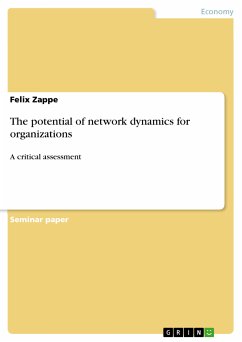Seminar paper from the year 2017 in the subject Leadership and Human Resources - Miscellaneous, grade: 1.0, University of Applied Sciences Kempten, course: IFEM, language: English, abstract: It is quite natural for human beings to be part of a network. Our way of thinking today is permeated by network and we live in an era of networks. Facebook, Twitter and Xing have many millions of users. Within months services like Pinterest and Instagram became leading companies. Networks are not really new. For generations people invested time taking part in networking events meeting others. The importance of building connections is intuitively obvious to everybody (Sattel 2014). Scientists of different areas and disciplines deal with the subject of networks. Networks are everywhere in relationships between people but also in cancer cells, in the brain, in mathematic graphs as well as in technical devices and of course in global economies. Solely in business and economy the diversity of networks is just incredible (Barabási 2015). The technical progress in current time revolutionized the possibilities of networking. The transport is cheaper, the infrastructures supreme, mobile telephony and not least the Internet have a great impact on the flexibility and quantity of networks today (Mogensen; Erikesen). The next economic revolution shall be called networked economy. It is not about Big Data or devices, but much more about people. People are the ones who continue to use technology and take part in the global ocean of data (Sharma 2015). Therefore for better understanding of network economy, it is useful to start describing networks or some network theories with regard to interpersonal relationships or networks between people.
Dieser Download kann aus rechtlichen Gründen nur mit Rechnungsadresse in A, B, BG, CY, CZ, D, DK, EW, E, FIN, F, GR, HR, H, IRL, I, LT, L, LR, M, NL, PL, P, R, S, SLO, SK ausgeliefert werden.









